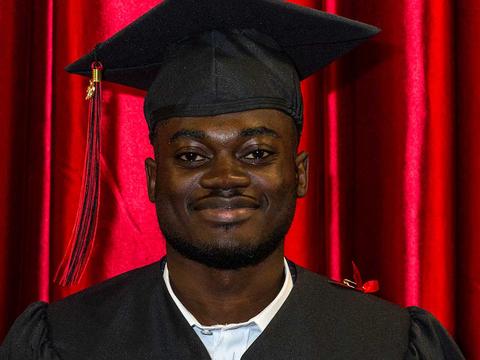Biochemistry Concentration
Haverford’s biochemistry program is located at the interface between the biological, chemical, and physical sciences. For our ambitious students and faculty who seek to understand biological processes from physical and chemical points of view, this is an especially exciting place to be.
Students pursuing the concentration must be biology, chemistry, or physics majors; and we offer a range of courses of study depending on the student’s particular area of interest. Concentrators can choose to focus on biochemistry, biophysics, or biochemistry/biophysics, all of which provide exceptional training for students interested in pursuing Ph.D. and/or M.D. degrees.
Curriculum & Courses
Our rigorous program combines classroom and laboratory training along with significant faculty mentorship—all in an environment that facilitates moving freely between traditional disciplinary boundaries.
Our curriculum varies depending on the particular concentration each student chooses to pursue. However, all students in the program must complete our core curriculum, which includes courses in biology, chemistry, and physics. Required courses include Biology 200, which covers cell structure and function; Biology 300, a lab in biochemistry and molecular biology; and Chemistry 112, which covers chemical dynamics. Concentrators must also take a math course at the level of calculus II or higher and an introductory physics class.
Additional courses specific to each student’s major combined with their biochemistry concentration are also required.
-
Concentration Requirements
Biochemistry/Biophysics Core Curriculum (required of all):
- BIOL H200 (Evolution, Genetics and Genomes) and BIOL H201 (Molecules, Cells, and Organisms)
- CHEM H104, CHEM H112, CHEM H114 (Chemical Dynamics).
- MATH H118 (Calculus II) or a one semester mathematics or statistics course with MATH H118 as a prerequisite.
- PHYS H105 and PHYS H106, or PHYS H101 and PHYS H102 (two semesters of Introductory Physics), or the Bryn Mawr equivalents.
Concentrators typically complete required coursework at the 200-level and higher in participating Haverford departments. One course taken elsewhere may be substituted with prior approval of the relevant department and the Concentration coordinator; students seeking additional flexibility may petition the Concentration Committee in advance regarding their needs and plans.
The advanced interdisciplinary coursework requirements vary by major and desired concentration:
Biology Major with a Biochemistry Concentration:
Biology majors seeking a biochemistry concentration must complete the biochemistry/biophysics core curriculum (see above) as well as the following additional requirements:
- CHEM H111 or CHEM H113 or CHEM H115 (Chemical Structure and Bonding), CHEM H222 and CHEM H225 (Organic Chemistry).
- CHEM H304 (Statistical Thermodynamics and Kinetics) or CHEM H305 (Quantum Chemistry).
- One semester of advanced biochemistry-related laboratory coursework: CHEM H301 or CHEM H302 (Laboratory in Chemical Structure and Reactivity) or BIOL/CHEM H303 (Laboratory in Biochemical Research). For concentrators, this course will count toward the Biology major in lieu of either BIOL H300 or BIOL H301.
- Two half-semester advanced courses with significant biochemistry content: CHEM H351 (Bioinorganic Chemistry), CHEM H352 (Topics in Biophysical Chemistry), and CHEM H357 (Topics in Bioorganic Chemistry); students may take topics courses multiple times with different topics.
- Two half-semester courses with significant biochemistry content: BIOL H311 (Advanced Genetic Analysis), BIOL H313 (Structure and Function of Macromolecules), BIOL H314 (Biochemistry: Metabolic Basis of Disease and Adaptation), BIOL H316 (Inter- and Intra-Cellular Communication), BIOL H320 (Molecular Microbiology), BIOL H322 (Cell Architecture), BIOL H324 (Photosynthesis), BIOL H326 (Biochemical Adaptations), BIOL H328 (Immunology), BIOL H334 (Biochemistry of Gene Expression), BIOL H336 (Cell Cycle), BIOL H337 (Pathogenic Microbiology), BIOL H451 (Molecular Motors and Biological Nano-Machines), BIOL H452 (Advanced Topics in Immunology), BIOL H454 (Advanced Topics in Virology), and BIOL H457 (Topics in Protein Science).
Biology Major with a Biophysics Concentration:
Biology majors seeking a biophysics concentration must complete the biochemistry/biophysics core curriculum (see above) as well as the following additional requirements:
- MATH H121 (Calculus III) or MATH H216 (Advanced Calculus).
- PHYS H213 (Waves and Optics), PHYS H211 (Laboratory in Electronics, Waves and Optics); half-credit course), and PHYS H301 (Advanced Laboratory in Modern Physics). For concentrators, PHYS H301 will count toward the Biology major in lieu of either BIOL H300 or BIOL H301.
- PHYS H214 (Quantum Mechanics) or CHEM H305 (Quantum Chemistry).
- PHYS H303 (Statistical Physics) or CHEM H304 (Statistical Thermodynamics and Kinetics).
- PHYS H320 (Topics in Biological Physics) or a similar course approved by the coordinating committee.
- Two half-semester courses with significant biophysics content: BIOL H311 (Advanced Genetic Analysis), BIOL H313 (Structure and Function of Macromolecules), BIOL H314 (Biochemistry: Metabolic Basis of Disease and Adaptation), BIOL H316 (Inter- and Intra-Cellular Communication), BIOL H320 (Molecular Microbiology), BIOL H322 (Cell Architecture), BIOL H324 (Photosynthesis), BIOL H326 (Biochemical Adaptations), BIOL H328 (Immunology), BIOL H336 (Cell Cycle), BIOL H337 (Pathogenic Microbiology), BIOL H451 (Molecular Motors and Biological Nano-Machines), BIOL H452 (Advanced Topics in Immunology), BIOL H454 (Advanced Topics in Virology), and BIOL H457 (Topics in Protein Science).
Chemistry Major with a Biochemistry Area of Concentration:
Chemistry majors desiring a biochemistry area of concentration must complete the biochemistry/biophysics core curriculum (see above) as well as the following additional requirements:
- One semester of advanced biochemistry-related laboratory coursework: normally BIOL H300 or BIOL H301 (Advanced Lab in Biology) or BIOL/CHEM H303 (Laboratory in Biochemical Research). Any of these courses, along with one semester of either CHEM H301 or CHEM H302, satisfy the advanced laboratory requirement for the Chemistry major.
- Two half-semester courses with significant biochemistry content: CHEM H351 (Bioinorganic Chemistry), CHEM H352 (Topics in Biophysical Chemistry), and CHEM H357 (Topics in Bioorganic Chemistry). Students may take topics courses multiple times with different topics.
- Two half-semester courses with significant biochemistry content: BIOL H311 (Advanced Genetic Analysis), BIOL H313 (Structure and Function of Macromolecules), BIOL H314 (Biochemistry: Metabolic Basis of Disease and Adaptation), BIOL H316 (Inter- and Intra-Cellular Communication), BIOL H320 (Molecular Microbiology), BIOL H322 (Cell Architecture), BIOL H324 (Photosynthesis), BIOL H326 (Biochemical Adaptations), BIOL H328 (Immunology), BIOL H334 (Biochemistry of Gene Expression), BIOL H336 (Cell Cycle), BIOL H337 (Pathogenic Microbiology), BIOL H451 (Molecular Motors and Biological Nano-Machines), BIOL H452 (Advanced Topics in Immunology), BIOL H454 (Advanced Topics in Virology), and BIOL H457 (Topics in Protein Science).
Physics Major with a Biophysics Area of Concentration:
Physics majors desiring a biophysics area of concentration must complete the biochemistry/biophysics core curriculum (see above) as well as the following additional requirements:
- An advanced biochemistry or biology laboratory course: one semester of BIOL H300 or BIOL H301 (Advanced Lab in Biology) or BIOL/CHEM H303 (Laboratory in Biochemical Research).
- Either PHYS H320 (Topics in Biological Physics) or two half-semester courses with significant biophysics content: BIOL H311 (Advanced Genetic Analysis), BIOL H313 (Structure and Function of Macromolecules), BIOL H314 (Biochemistry: Metabolic Basis of Disease and Adaptation), BIOL H316 (Inter- and Intra-Cellular Communication), BIOL H320 (Molecular Microbiology), BIOL H322 (Cell Architecture), BIOL H324 (Photosynthesis), BIOL H326 (Biochemical Adaptations), BIOL H328 (Immunology), BIOL H336 (Cell Cycle), BIOL H337 (Pathogenic Microbiology), BIOL H451 (Molecular Motors and Biological Nano-Machines), BIOL H452 (Advanced Topics in Immunology), BIOL H454 (Advanced Topics in Virology), and BIOL H457 (Topics in Protein Science).
The advanced biochemistry or biology laboratory course satisfies the Physics major requirement for an upper level laboratory course requirement, and Physics 320 may count as one of the 300-level physics lecture courses required for the Physics major.
Associated Programs and Concentrations
Research & Outreach

The chemistry major with a biochemistry concentration explored the enzymatic production of organic molecules with medicinal properties for her thesis.

The chemistry major’s thesis offers valuable insights into the field of biochemistry, but also the act of research itself.

Hoang's thesis explored molecular and enzymatic diversity in bacteria that has major pharmaceutical implications.

The chemistry major’s thesis research identified a compound that could function as an antibiotic.

The chemistry major, biochemistry concentrator, and French and Francophone studies minor reflects on the collaborative aspects of his thesis process.

The chemistry major’s thesis involved innovative research that was published in a high-impact science journal.
After Graduation

A chemistry major, Haupt now sets her sights on a Ph.D. in bioengineering, focusing on research and innovation. She encourages graduates to embrace opportunities and stay engaged.

The biology major is starting Harvard University’s Ph.D. program in biological and biomedical sciences.

The chemistry major is communicating with patients and contributing to ALS treatment research.

Shah is doing cancer research in his two-year fellowship at the National Institutes of Health.

Nguyen left a job in academia to move into the public health field.

Hosler shifted from academia to a career in science communication and outreach.
Keep Exploring
More Programs
Check out our other academic offerings:
Get in Touch
Join the Mailing List or search for events in your area.
You can find detailed instructions and information on the Application Instructions page. If you need to contact us directly, please send an email to admission@haverford.edu.
Get Social with Haverford